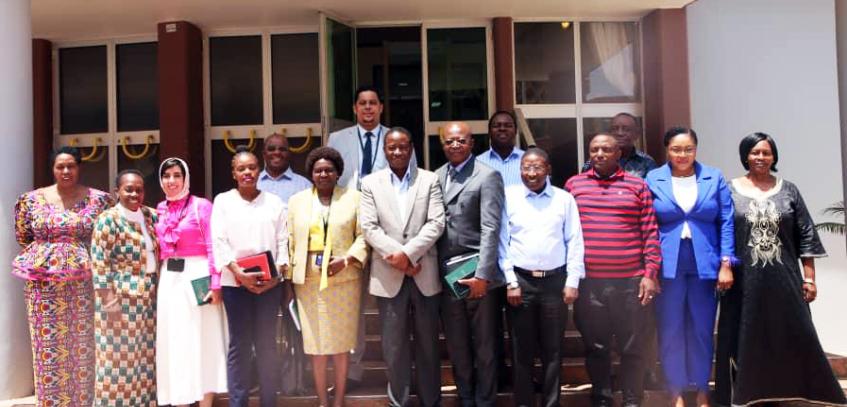The Pan-African Parliament Permanent Committee on Trade, Customs, and Immigration Matters has identified the ratification and domestication of the Protocol to the Treaty Establishing the African Economic Community—related to the Free Movement of Persons, Right of Residence, and Right of Establishment—as crucial to unlocking the full potential of the African Continental Free Trade Area (AfCFTA).
As part of a fact-finding mission, the Committee has arrived in the United Republic of Tanzania to assess the country’s progress in implementing the AfCFTA’s Guided Trade Initiative (GTI).
Another component of the mission is a site visit to the Namanga One Stop Border Post (OSBP), a vital crossing point between Tanzania and Kenya, for a firsthand experience of how the introduction of the OSBP, along with improvements in road infrastructure and customs procedures, has facilitated the free movement of people and goods between the two countries.
The first engagement of the Pan-African Parliament delegation took place today with the Permanent Committee on Industries, Trade, Agriculture, and Livestock of the National Assembly of Tanzania. During this session, the members of the Pan-African Parliament underscored the link between trade and the AfCFTA’s fourth pillar, which focuses on the Free Movement of Persons, Migration, and Labor.
African Parliamentarians also reviewed parliamentary oversight mechanisms to ensure the Tanzanian government’s effective implementation of the GTI.
Launched in Accra, Ghana, on 7 October, the GTI aims to promote meaningful commercial trade and test operational, institutional, legal, and trade policy frameworks under the AfCFTA. Tanzania is one of eight countries participating in the GTI, alongside Cameroon, Egypt, Ghana, Kenya, Mauritius, Rwanda, and Tunisia, representing Africa’s five regions.
“We commend Tanzania for its significant progress in creating a unified African market and the various operational tools launched to facilitate trade under the AfCFTA. During our fact-finding mission, we will examine both the advancements and challenges of trading under the AfCFTA Agreement, particularly cross-border trade and the free movement of people. Evidence fshows that well-managed free movement of individuals is essential for integrated economic development,” said Hon. Sen. Prof. Margaret Kamar (Kenya), leader of the Pan-African Parliament delegation to Tanzania.
Hon. Deodatus Mwanyika (MP), Chair of the Tanzanian Permanent Committee of Parliament on Industries, Trade, Agriculture, and Livestock, highlighted the oversight conducted by his Committee to ensure stakeholders fulfill their commitments to enhancing intra-African trade.
Welcoming the Pan-African Parliament to Tanzania, he emphasized the importance of engaging thoroughly with key stakeholders to gather accurate, real-time information. "We are encouraged by your upcoming meetings with relevant government officials responsible for Trade, Customs, and Immigration, alongside other stakeholders, which will ensure the mission's objectives are fully realized," he stated.
In addition to their discussions, the Pan-African Parliament Committee on Trade will advocate for Tanzania’s ratification of the African Union Protocol on Free Movement of Persons, Right of Residence, and Right of Establishment, which is pending ratification by Tanzania.
Throughout the mission, the Pan-African Parliament delegation will engage with key stakeholders, including representatives from Tanzania’s Ministry of Industry and Trade, Ministry of Foreign Affairs and East African Cooperation, civil society organizations involved in trade and immigration, and various business associations.
The Pan-African Parliament delegation, led by Hon. Sen. Prof. Margaret Kamar, includes Hon. Hannaa Benkhair (Morocco), Hon. Mathurin Massckini (Central African Republic), Hon. Wavel Joseph Woodcock (Seychelles), and Hon. Anatropia Lwehikila Theonest (Tanzania). They are joined by Hon. Ng’wasi Damas Kamani, leader of the Tanzanian delegation to the Pan-African Parliament.
The findings from this mission will be compiled into a report, which will be presented during the next Pan-African Parliament Ordinary Session. This report will help the Parliament reflect on the progress of the AfCFTA through the GTI and promote its implementation across other African nations, with free movement as a foundational element. Additionally, the report will emphasize the importance of facilitating the movement of people, goods, and services across borders and the promotion of the One Stop Border Post (OSBP) concept throughout the continent.








